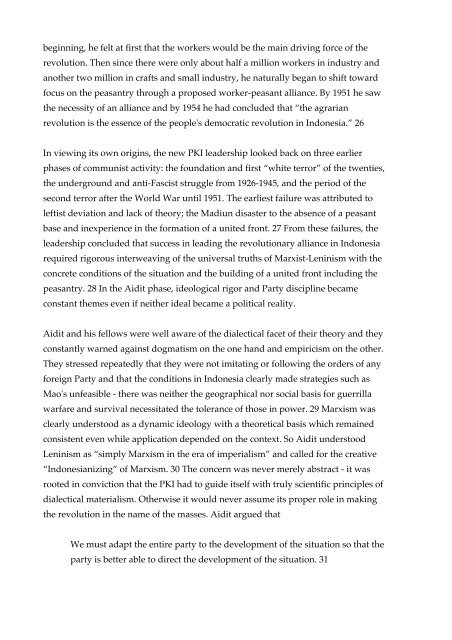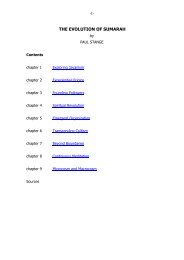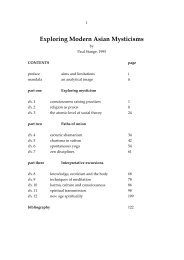Javanese Mystical and Marxist Dialectics - Paul Stange
Javanese Mystical and Marxist Dialectics - Paul Stange
Javanese Mystical and Marxist Dialectics - Paul Stange
Create successful ePaper yourself
Turn your PDF publications into a flip-book with our unique Google optimized e-Paper software.
eginning, he felt at first that the workers would be the main driving force of therevolution. Then since there were only about half a million workers in industry <strong>and</strong>another two million in crafts <strong>and</strong> small industry, he naturally began to shift towardfocus on the peasantry through a proposed worker-peasant alliance. By 1951 he sawthe necessity of an alliance <strong>and</strong> by 1954 he had concluded that “the agrarianrevolution is the essence of the people's democratic revolution in Indonesia.” 26In viewing its own origins, the new PKI leadership looked back on three earlierphases of communist activity: the foundation <strong>and</strong> first “white terror” of the twenties,the underground <strong>and</strong> anti-Fascist struggle from 1926-1945, <strong>and</strong> the period of thesecond terror after the World War until 1951. The earliest failure was attributed toleftist deviation <strong>and</strong> lack of theory; the Madiun disaster to the absence of a peasantbase <strong>and</strong> inexperience in the formation of a united front. 27 From these failures, theleadership concluded that success in leading the revolutionary alliance in Indonesiarequired rigorous interweaving of the universal truths of <strong>Marxist</strong>-Leninism with theconcrete conditions of the situation <strong>and</strong> the building of a united front including thepeasantry. 28 In the Aidit phase, ideological rigor <strong>and</strong> Party discipline becameconstant themes even if neither ideal became a political reality.Aidit <strong>and</strong> his fellows were well aware of the dialectical facet of their theory <strong>and</strong> theyconstantly warned against dogmatism on the one h<strong>and</strong> <strong>and</strong> empiricism on the other.They stressed repeatedly that they were not imitating or following the orders of anyforeign Party <strong>and</strong> that the conditions in Indonesia clearly made strategies such asMao's unfeasible - there was neither the geographical nor social basis for guerrillawarfare <strong>and</strong> survival necessitated the tolerance of those in power. 29 Marxism wasclearly understood as a dynamic ideology with a theoretical basis which remainedconsistent even while application depended on the context. So Aidit understoodLeninism as “simply Marxism in the era of imperialism” <strong>and</strong> called for the creative“Indonesianizing” of Marxism. 30 The concern was never merely abstract - it wasrooted in conviction that the PKI had to guide itself with truly scientific principles ofdialectical materialism. Otherwise it would never assume its proper role in makingthe revolution in the name of the masses. Aidit argued thatWe must adapt the entire party to the development of the situation so that theparty is better able to direct the development of the situation. 31




